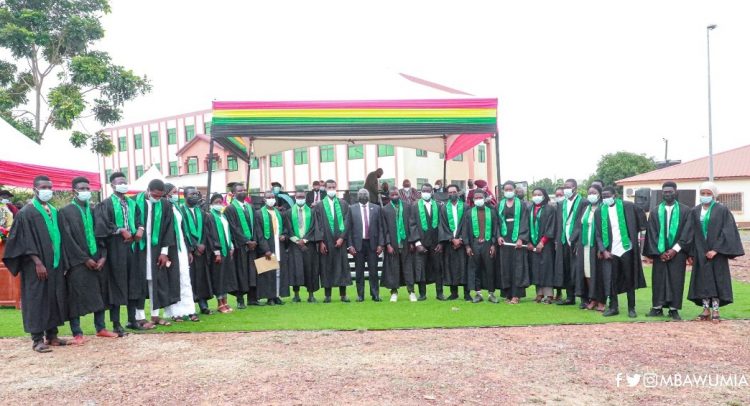The graduating students pose with Vice President Mahamudu Bawumia at the end of the programme
Innovations introduced a few years ago by the government of President Akufo-Addo, which seemed science fictional at the time, are today game changers.
Those were the remarks of Vice President Mahamudu Bawumia when he spoke as special guest of honour during the first matriculation and graduation of the Madina Institute of Science And Technology in Accra last Thursday.
Breaking down these innovations, he pointed at the use of drones to deliver as he put it “over 150 different medicines to remote locations across the country, adding “we introduced the Ghana (ID) Card to provide legal identity to our citizens, and established the digital address system so that we can register businesses and geoposition them so that prospective clients, partners and others can locate them.”
On the introduction of the Mobile Money Interoperability Framework to facilitate the transfer of funds by mobile money customers from one mobile money wallet to another wallet across networks, he explained that “the project did not only make inter-network transactions convenient and easy; it also facilitated the financial inclusion of the non-banked community in Ghana and has also been significantly instrumental in Ghana’s progress towards a cash lite society.”
He called for partnership between our universities, industry and government, adding “indeed, there is a lot more that we, as government, in partnership with the universities and research institutions can do on the back of the Science and Technology Policy launched by President Nana Addo Dankwa Akufo-Addo at Peduase Lodge on January 21, 2019.
To facilitate the university/research institution, industry and government interaction and collaboration, he disclosed “the government of Nana Addo Dankwa Akuffo-Addo has established a Ghana Innovation and Research Commercialisation (GIRC) Centre at CSIR.”
On his part, Prof. Abdulai Salifu Asiro, President of the MIST, said the fresh graduates are well baked and will integrate knowledge and practical experience to promote learning, research and citizenship.
The university, he went on, “has a very conducive environment for teaching and learning, as we have a serene environment with small class sizes.”
Sixty one (61) students, forty-six from Business, and fifteen from Engineering, out of which number he said “nine had First Class, forty-one Second Class Upper, and ten Second Class Lower awards.”
The university, he said, has passed through challenges, but its trustees have kept faith, and supported them tremendously. “Our Chairman, Mr. Salem Kalmoni, MD of Japan Motors, deserves great commendation for a yeoman’s job. Al-Diaa Society, an NGO, has been phenomenal too,” he pointed out.
The university, he announced, plans to introduce BA Arabic Education, BA Computer Science, BSc Nursing and Midwifery to satisfy, as he said, “demands of our target market following the research done by the university.”
By A.R. Gomda


